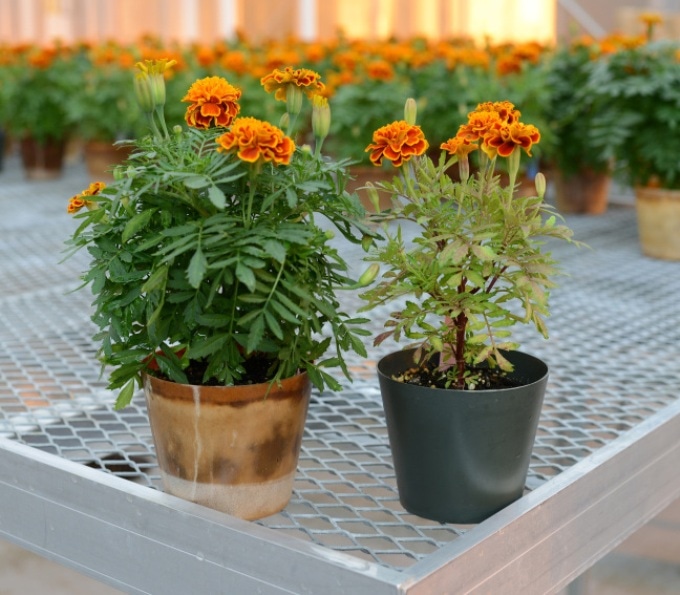Nov 23 2016
A research work carried out by horticulturists at the Iowa State University showed that innovative bioplastic materials can allow gardeners to take sustainable care of their plants and can also assist the plants to “self-fertilize” and to develop healthier roots.
 The flower on the left is planted in a self-fertilizing bioplastic container while the flower on the right is planted in a conventional petroleum-based pot. ISU researchers have studied the environmental advantages bioplastic containers may present. Credit: Photo courtesy of James Schrader.
The flower on the left is planted in a self-fertilizing bioplastic container while the flower on the right is planted in a conventional petroleum-based pot. ISU researchers have studied the environmental advantages bioplastic containers may present. Credit: Photo courtesy of James Schrader.
William Graves, associate dean of the ISU Graduate College and professor of horticulture, highlighted the numerous environmental advantages of bioplastics, e.g. improved biodegradability, which cannot be provided by traditional petroleum-based plastics. Graves worked in collaboration with James Schrader, an associate scientist in horticulture, and a group of scientists on a recently concluded 5-year research on bioplastics in an endeavor to find out materials that can be used for horticultural purposes, such as the flats and plastic pots used by retailers to sell immature plants.
Graves said that since bioplastics are made of renewable biological sources such as plants, large-scale utilization of such materials in the marketplace can considerably reduce the over-reliance on fossil fuels.
The research involved working through several options for producing bioplastics made from sources such as polylactic acid as well as polyhydroxyalkanoates that are more biodegradable. The sources also include byproducts of corn, ethanol, and soybeans production.
We narrowed the available materials down to a small number and found a handful of options that can be the solutions, depending largely on the length of use.
William Graves, associae dean of the ISU graduate college
The researchers also discovered that bioplastic containers could offer one significant advantage when compared to petroleum products, i.e. the potential to self-fertilize the plants.
According to Graves, plastics produced from bio-based materials have the ability to liberate nutrients when the plastic degrades, thus reducing the workload of gardeners. This also enhances the root growth, thereby improving the performance of a plant when it is transplanted into another container or into soil.
The research was funded by the U.S. Department of Agriculture’s National Institute for Food and Agriculture under a $1.94 million grant, and it produced some astonishing results while carrying out market research related to consumer preferences of bioplastics. The researchers anticipated that consumers would prefer bioplastic products as they were very similar to petroleum plastics in texture, color, and appearance. By contrast, the outcomes indicated that some consumers preferred materials distinct from the more environment-friendly alternatives.
“A lot of people want a biocontainer to look earthy and not artificial,” Graves said.
He further added that such a choice may avoid the need for bioplastic manufacturers to imitate the appearance of traditional plastics.
The research concluded that the manufacturing cost of one unit of pot made of bioplastics is more than that made of traditional petroleum plastics by 2-11 cents. However, Schrader added that some gardeners may be ready to spend a little more for products that are environment-friendly. He perceives that bioplastics have the prospective potential to cater to a niche market that can get wider by the day.
Our results show that people may be willing to pay a premium for sustainability and for the fertilizer option. The market will start small, with smaller growers selling to environmentally minded clients, but that’ll get the ball rolling, and market share will evolve as prices for bioplastic approach equilibrium with petroleum-based plastic.
James Schrader, associate scientist in horticulture